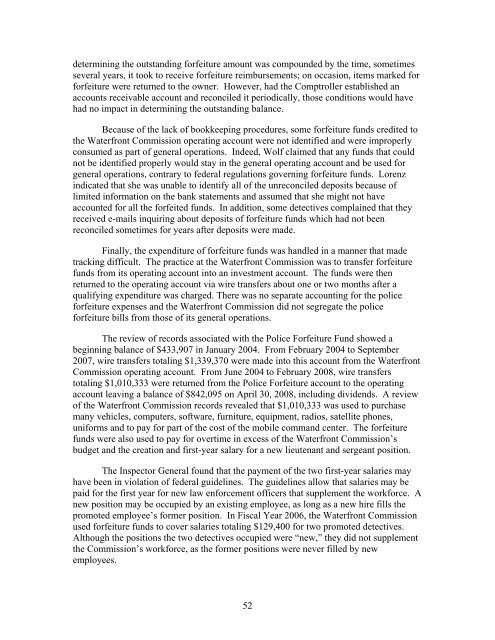Investigation of the Waterfront Commission of New York Harbor
Investigation of the Waterfront Commission of New York Harbor
Investigation of the Waterfront Commission of New York Harbor
Create successful ePaper yourself
Turn your PDF publications into a flip-book with our unique Google optimized e-Paper software.
determining <strong>the</strong> outstanding forfeiture amount was compounded by <strong>the</strong> time, sometimesseveral years, it took to receive forfeiture reimbursements; on occasion, items marked forforfeiture were returned to <strong>the</strong> owner. However, had <strong>the</strong> Comptroller established anaccounts receivable account and reconciled it periodically, those conditions would havehad no impact in determining <strong>the</strong> outstanding balance.Because <strong>of</strong> <strong>the</strong> lack <strong>of</strong> bookkeeping procedures, some forfeiture funds credited to<strong>the</strong> <strong>Waterfront</strong> <strong>Commission</strong> operating account were not identified and were improperlyconsumed as part <strong>of</strong> general operations. Indeed, Wolf claimed that any funds that couldnot be identified properly would stay in <strong>the</strong> general operating account and be used forgeneral operations, contrary to federal regulations governing forfeiture funds. Lorenzindicated that she was unable to identify all <strong>of</strong> <strong>the</strong> unreconciled deposits because <strong>of</strong>limited information on <strong>the</strong> bank statements and assumed that she might not haveaccounted for all <strong>the</strong> forfeited funds. In addition, some detectives complained that <strong>the</strong>yreceived e-mails inquiring about deposits <strong>of</strong> forfeiture funds which had not beenreconciled sometimes for years after deposits were made.Finally, <strong>the</strong> expenditure <strong>of</strong> forfeiture funds was handled in a manner that madetracking difficult. The practice at <strong>the</strong> <strong>Waterfront</strong> <strong>Commission</strong> was to transfer forfeiturefunds from its operating account into an investment account. The funds were <strong>the</strong>nreturned to <strong>the</strong> operating account via wire transfers about one or two months after aqualifying expenditure was charged. There was no separate accounting for <strong>the</strong> policeforfeiture expenses and <strong>the</strong> <strong>Waterfront</strong> <strong>Commission</strong> did not segregate <strong>the</strong> policeforfeiture bills from those <strong>of</strong> its general operations.The review <strong>of</strong> records associated with <strong>the</strong> Police Forfeiture Fund showed abeginning balance <strong>of</strong> $433,907 in January 2004. From February 2004 to September2007, wire transfers totaling $1,339,370 were made into this account from <strong>the</strong> <strong>Waterfront</strong><strong>Commission</strong> operating account. From June 2004 to February 2008, wire transferstotaling $1,010,333 were returned from <strong>the</strong> Police Forfeiture account to <strong>the</strong> operatingaccount leaving a balance <strong>of</strong> $842,095 on April 30, 2008, including dividends. A review<strong>of</strong> <strong>the</strong> <strong>Waterfront</strong> <strong>Commission</strong> records revealed that $1,010,333 was used to purchasemany vehicles, computers, s<strong>of</strong>tware, furniture, equipment, radios, satellite phones,uniforms and to pay for part <strong>of</strong> <strong>the</strong> cost <strong>of</strong> <strong>the</strong> mobile command center. The forfeiturefunds were also used to pay for overtime in excess <strong>of</strong> <strong>the</strong> <strong>Waterfront</strong> <strong>Commission</strong>’sbudget and <strong>the</strong> creation and first-year salary for a new lieutenant and sergeant position.The Inspector General found that <strong>the</strong> payment <strong>of</strong> <strong>the</strong> two first-year salaries mayhave been in violation <strong>of</strong> federal guidelines. The guidelines allow that salaries may bepaid for <strong>the</strong> first year for new law enforcement <strong>of</strong>ficers that supplement <strong>the</strong> workforce. Anew position may be occupied by an existing employee, as long as a new hire fills <strong>the</strong>promoted employee’s former position. In Fiscal Year 2006, <strong>the</strong> <strong>Waterfront</strong> <strong>Commission</strong>used forfeiture funds to cover salaries totaling $129,400 for two promoted detectives.Although <strong>the</strong> positions <strong>the</strong> two detectives occupied were “new,” <strong>the</strong>y did not supplement<strong>the</strong> <strong>Commission</strong>’s workforce, as <strong>the</strong> former positions were never filled by newemployees.52


